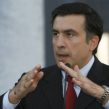
Radical Georgian Opposition Considers Shift in Tactics
Publication: Eurasia Daily Monitor Volume: 6 Issue: 91
By:

On May 11 in Tbilisi, a four-member delegation of the opposition’s coalition held talks with President Mikheil Saakashvili and Parliamentary Chairman Davit Bakradze. This was the first time the extra-parliamentary opposition took up the government’s often-repeated invitation to hold talks, since the start of daily anti-government demonstrations April 9 in Tbilisi. With those demonstrations losing steam and never picking up outside the capital, the radical opposition is reconsidering its tactics on two tracks: a dialogue with the authorities and an equally possible escalation in the streets to the brink of using force.
The May 11 talks were predictably inconclusive. Saakashvili nevertheless described the mere fact that talks were held at long last as a victory for Georgian democracy, and called for continuing talks in a regular format: "Our message … was and always will be about holding dialogue, a balanced and open, civilized discussion, given that the [civil conflicts of the] 1990’s have shown the results of radicalization" (Rustavi-2 TV, Civil Georgia, May 11).
Almost all the opposition groups have constantly sought the president’s resignation since June 2007. They would only hold talks about the modalities of his resignation. In this sense, the delegation’s composition reflected the opposition’s internal balance of forces. Since April 9, moreover, the radical opposition also wanted new parliamentary elections, barely one year after presidential (itself pre-term) and parliamentary elections were held -which Western observers deemed fair and a clear improvement on the past. When one particular EU envoy suggested just ahead of the May 11 talks that holding pre-term parliamentary elections later this year or early next year should be considered, he did not reflect EU policy.
These talks could not be other than inconclusive, given the composition of the opposition’s delegation. Leaders of opposition parties (17 parties, some of them consisting in turn of several parties each) nominated Irakli Alasania, Levan Gachechiladze, Salome Zourabichvili, and Kakha Shartava for the delegation. Gachechiladze’s political record and temperament is that of a fiery agitator. The French-born Zourabichvili turned into such an agitator some time ago (to the consternation of her former colleagues from the European diplomatic community) and arrived at the talks from a street rally, where she sang an improvised song opposing any form of dialogue. Shartava represents a small pseudo-nationalist group that invokes Georgian traditional values and orthodoxy to oppose Western influences. The three radical delegates clearly outweighed the relatively moderate Alasania.
Apparently, opposition leaders structured the delegation in such a way as to eschew serious discussion, but still be seen as accepting the formalities of a dialogue with the government and even with the president. For his part, Alasania seeks to advance toward a substantive dialogue on constitutional and institutional reforms. Following the May 11 talks he commented that substantive issues could not be resolved on the first meeting and that a continuous process is necessary. He also alluded to his differences with other factions: "We have different views on how the crisis can be resolved". Gachechiladze, however, went back to the street rally to call for "more intense" protests in the coming days. "The protests will continue today and tomorrow, and for a long time" (Civil Georgia, Imedi TV, BBC, May 11).
Alasania is almost isolated among the radical groups and has no organization of his own. While the radicals can traditionally mobilize a few thousand demonstrators and appeal to certain Tbilisi street constituencies in their accustomed style, Alasania is a newcomer to internal politics and relies on a small team of former diplomatic service colleagues. As a new, figurehead leader of the small Republican and New Right parties’ bloc, the soft-spoken Alasania is being out-shouted and overruled by radical leaders of those two groups. Their small size notwithstanding, the Republicans and New Right are themselves divided among radical and less radical mini-factions.
The president, parliamentary leaders, and government propose to discuss sharing parliamentary committee chairmanships with opposition parties (if they take their seats in parliament, which they have refused); expanding parliamentary oversight and the legislature’s powers at the expense of the executive branch; reform of the judiciary; and changing the electoral law in ways that would increase the opposition’s parliamentary representation.
The parliamentary leadership proposes forming a joint commission with the extra-parliamentary as well as the parliamentary opposition to draft such changes. Presidential and parliamentary elections, however, would be held within the existing constitutional time-frame for such elections. The authorities as well as the European Union are all too aware of the risk that holding elections seemingly on a permanent basis at the opposition’s whim would be a recipe for permanent turmoil.




